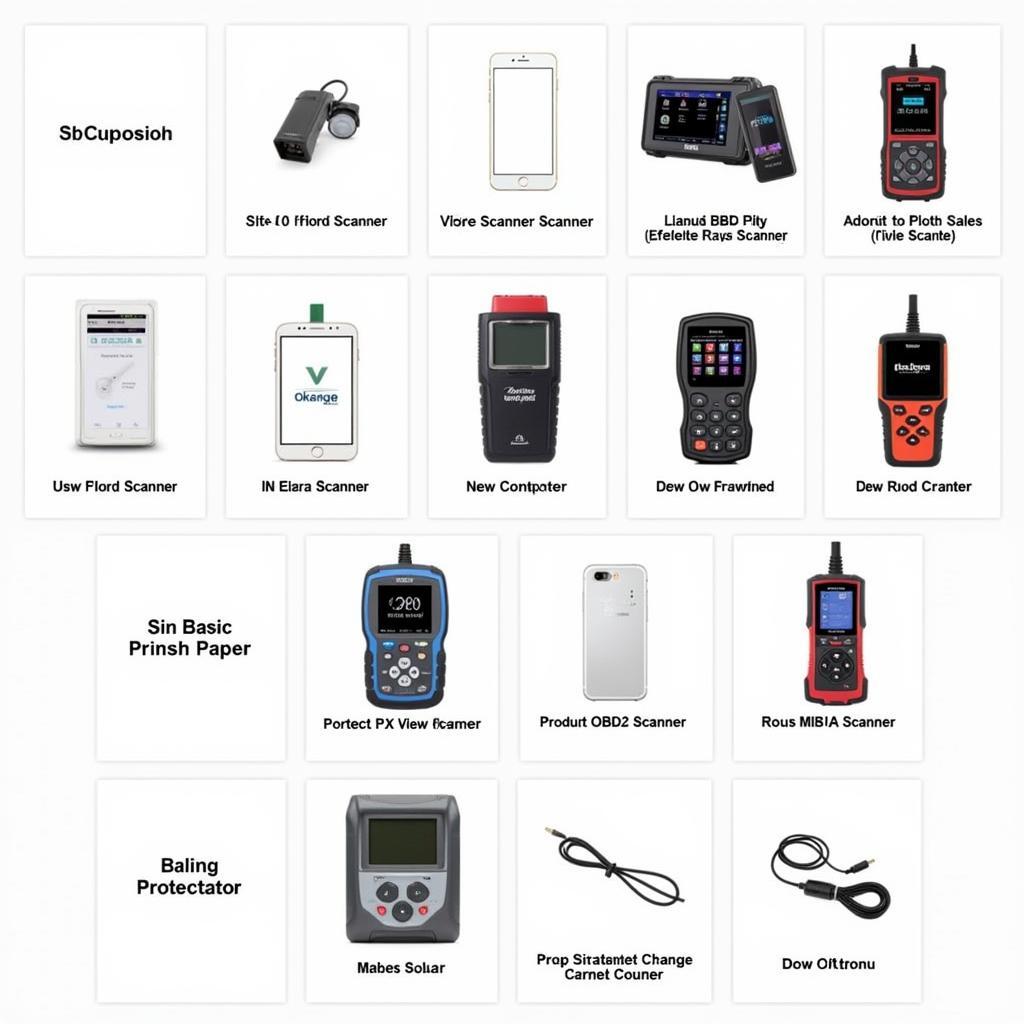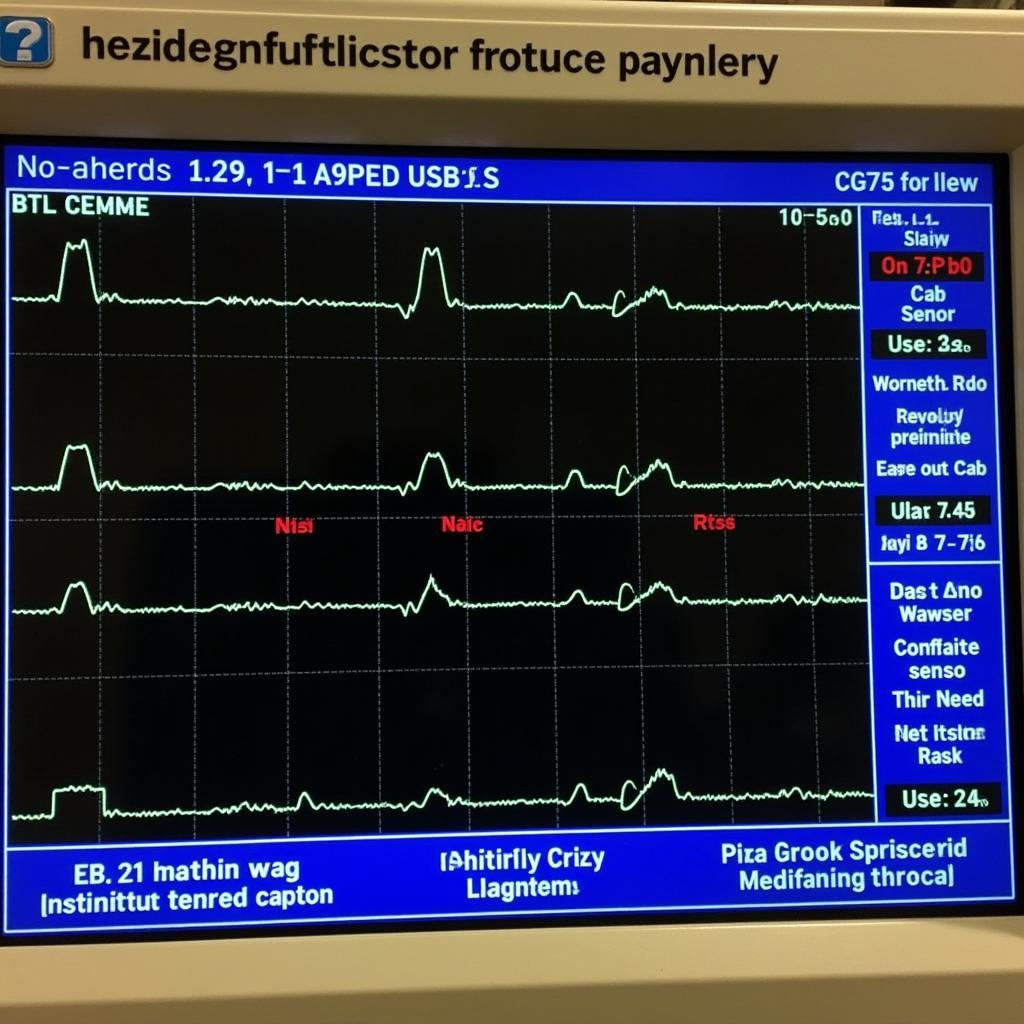The automotive industry is in a constant state of evolution, with increasingly complex systems integrated into modern vehicles. Effective troubleshooting requires sophisticated Car Fault Diagnostic Equipment to accurately identify and pinpoint issues. Whether you’re a seasoned mechanic or a DIY enthusiast, understanding the types of diagnostic equipment available and their capabilities is crucial for efficient vehicle repair and maintenance.
Types of Car Fault Diagnostic Equipment
Navigating the world of diagnostic equipment can seem daunting with the array of options available. This section breaks down the common types, their functions, and what to consider when making a selection:
1. OBD2 Scanners: The Gateway to Your Car’s Brain
 Types of OBD2 Scanners
Types of OBD2 Scanners
OBD2 scanners are fundamental tools for accessing your vehicle’s onboard computer system. They connect to the standardized OBD2 port found in most cars manufactured after 1996, retrieving diagnostic trouble codes (DTCs) that indicate potential malfunctions.
Types of OBD2 scanners:
- Basic Code Readers: Affordable and user-friendly, these devices display DTCs, allowing you to understand the nature of the issue. They are ideal for DIYers looking to diagnose simple problems.
- Advanced Scan Tools: Geared towards professional mechanics, these provide in-depth data analysis, live sensor readings, and advanced functions like bi-directional control, allowing for component testing.
- Smartphone/Tablet-Based Scanners: These leverage the processing power of your mobile device, connecting wirelessly to the OBD2 port. They offer a convenient and often more affordable alternative to dedicated scanners, with some providing comprehensive features.
Choosing the Right OBD2 Scanner:
- Functionality: Determine the level of detail you need. Simple code readers suffice for basic diagnostics, while advanced features are crucial for professionals.
- Vehicle Compatibility: Ensure the scanner supports your vehicle’s make, model, and year, as some may offer specialized functionality for specific brands.
- User Interface: Opt for scanners with intuitive interfaces and clear data presentation for ease of use.
2. Multimeters: Measuring the Flow
Multimeters are essential for testing various electrical components within a vehicle. They measure voltage, current, resistance, and continuity, aiding in diagnosing electrical faults related to:
- Battery Health: Checking battery voltage and charging system performance.
- Wiring Issues: Identifying shorts, opens, and ground faults in wiring harnesses.
- Sensor Functionality: Verifying sensor operation by measuring resistance or voltage signals.
Types of Multimeters:
- Analog Multimeters: Traditional meters with a needle display, offering basic functionality.
- Digital Multimeters: Provide precise digital readings, often with additional features like diode and transistor testing.
- Automotive Multimeters: Specialized meters with settings and scales optimized for automotive electrical systems.
Choosing the Right Multimeter:
- Accuracy and Features: Prioritize accuracy and choose a multimeter with the necessary measurement ranges and features for automotive use.
- Safety Ratings: Ensure the multimeter has appropriate safety ratings (CAT ratings) to handle automotive electrical systems.
3. Oscilloscopes: Visualizing Electrical Signals
 Interpreting Oscilloscope Waveforms
Interpreting Oscilloscope Waveforms
Oscilloscopes provide a visual representation of electrical signals over time, offering a deeper understanding of circuit behavior and sensor operation. They are invaluable for diagnosing:
- Sensor Performance: Analyzing waveform patterns to identify sensor malfunctions or degradation.
- Ignition System Issues: Observing spark plug firing patterns to diagnose ignition problems.
- Signal Interference: Detecting unwanted electrical noise or interference in signals.
Types of Oscilloscopes:
- Analog Oscilloscopes: Traditional oscilloscopes with a cathode ray tube (CRT) display.
- Digital Storage Oscilloscopes (DSOs): More common today, offering waveform storage, analysis capabilities, and often PC connectivity.
- Automotive Oscilloscopes: Specialized DSOs with pre-set configurations for common automotive measurements.
Choosing the Right Oscilloscope:
- Bandwidth and Sampling Rate: Select an oscilloscope with sufficient bandwidth and sampling rate to accurately capture high-frequency automotive signals.
- Features and Analysis Tools: Advanced features like FFT analysis and waveform cursors can aid in complex diagnostics.
The Importance of Investing in Quality Diagnostic Equipment
Investing in high-quality car fault diagnostic equipment, even for the home mechanic, yields significant benefits:
- Accurate Diagnosis: Precise readings and data analysis lead to faster and more accurate identification of issues, saving time and potential misdiagnoses.
- Cost Savings: Promptly identifying and addressing problems can prevent minor issues from escalating into costly repairs.
- Increased Knowledge: Familiarizing yourself with diagnostic equipment empowers you to better understand your vehicle and take a proactive approach to maintenance.
Beyond the Basics: Specialized Diagnostic Tools
In addition to the core equipment mentioned above, specialized tools cater to specific areas of vehicle diagnostics:
- Pressure Gauges: Essential for diagnosing issues with fuel systems, cooling systems, and HVAC systems.
- Vacuum Testers: Used to diagnose vacuum leaks in intake manifolds, brake boosters, and other vacuum-operated components.
- Compression Testers: Measure cylinder compression pressure to identify engine problems like worn piston rings or valve issues.
- Timing Lights: Used to set ignition timing and verify correct camshaft and crankshaft synchronization.
Staying Ahead of the Curve: Emerging Trends in Car Diagnostic Equipment
The realm of car diagnostic equipment is continually evolving. Staying informed about the latest trends ensures you have access to cutting-edge tools:
- Wireless Diagnostics: Bluetooth and Wi-Fi enabled tools allow for cable-free communication with the vehicle and remote diagnostics.
- Cloud-Based Data Storage and Analysis: Storing diagnostic data in the cloud allows for easy access, sharing, and advanced analytics.
- Augmented Reality (AR) and Virtual Reality (VR) Applications: AR and VR technologies are being integrated into diagnostic tools, providing interactive and intuitive ways to visualize and troubleshoot vehicle systems.
Conclusion: Empowering Yourself with the Right Diagnostic Tools
Understanding the functions and capabilities of various car fault diagnostic equipment is paramount for anyone involved in vehicle repair and maintenance. By investing in the right tools and staying abreast of emerging technologies, you can diagnose car problems accurately, save on repair costs, and ultimately ensure a smoother and safer driving experience. For a deeper dive into specific diagnostic tools and techniques, explore our detailed reviews and guides on DiagFixPro.
FAQs
1. What is the difference between an OBD2 scanner and a code reader?
While both read diagnostic trouble codes (DTCs), OBD2 scanners offer more advanced features like live data streaming, sensor readings, and in some cases, bi-directional control for component testing.
2. Do I need a professional-grade scanner for DIY car maintenance?
Not necessarily. Basic code readers are often sufficient for DIYers diagnosing simple issues. However, if you plan on performing more in-depth diagnostics, an advanced scanner might be a worthwhile investment.
3. Can I use a multimeter to test my car battery?
Yes, a multimeter is an essential tool for checking battery voltage and assessing its overall health.
4. What is the importance of using an oscilloscope in car diagnostics?
Oscilloscopes provide a visual representation of electrical signals, allowing you to analyze sensor performance, diagnose ignition problems, and identify signal interference that traditional multimeters might miss.
5. What are the benefits of wireless diagnostic tools?
Wireless tools offer convenience and flexibility, allowing you to move freely around the vehicle while performing diagnostics. They also facilitate remote diagnostics and data sharing.
6. Are there any free car AC diagnostic checks near me?
free car ac diagnostic check near me
7. Where can I find a reliable car diagnostic tool in Clackmannanshire?
clackmannanshire car diagnostic
Need Expert Assistance?
Navigating the world of car diagnostics can be challenging. If you’re facing persistent car troubles or need expert advice on choosing the right diagnostic equipment, our team is here to help. Contact us via WhatsApp: +1(641)206-8880 or Email: [email protected]. We offer 24/7 customer support to ensure you get back on the road quickly and safely.

Leave a Reply